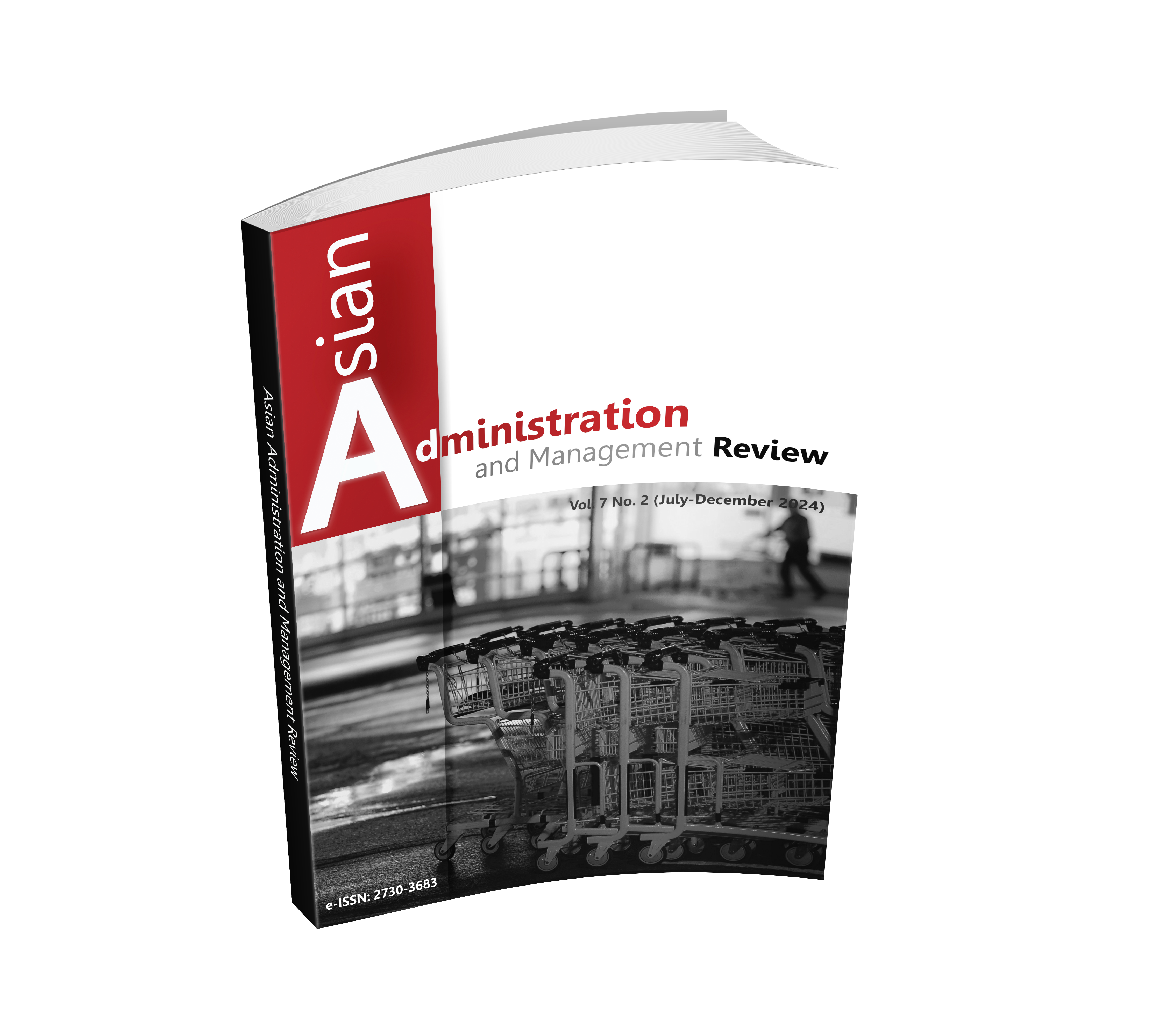HOW DIFFERENT LEVELS OF ORGANIZATIONAL SUPPORT MODERATE THE RELATIONSHIP BETWEEN WORK-LIFE BALANCE AND TASK PERFORMANCE?
DOI:
https://doi.org/10.14456/aamr.2024.30Keywords:
Organizational Support, Work Life Balance, Task Performance, Generation Z, ThailandAbstract
Investigated in this study is the impact of work-life balance on task performance, with organizational support serving as the moderating factor. The focus is on the Generation Z workforce in Central Thailand. The data collection sample consisted of 160 participants using convenience sampling and analyzed using Process Macro model 1. Findings indicate that all dimensions of work-life balance positively influence task performance, and the strongest effect was exerted by the work dimension. Additionally, the moderating effect of organizational support significantly enhances the relationship between work-life balance and task performance. The intellectual dimension, when moderated by organizational support, has the most pronounced impact on task performance. These results generate valuable insights, and they have both theoretical and practical implications for managing Generation Z in Central Thailand. Studies have shown that varying levels of organizational support constitute a key factor influencing task performance. Specifically, a high level of organizational support leads to markedly higher task performance. A discussion of these findings along with implications for theory and practice is presented.
Downloads
References
Allen, T., Herst, D., Bruck, C., & Sutton, M. (2000). Consequences associated with work-to-family conflict: a review and agenda for future research. Journal of Occupational Health Psychology, 5(2), 278-308.
Alvi, A., Zulfiqar, M., Haneef, M., & Haider, R. (2014). A study of perceived organizational & supervisor support about employees in banking sector of pakistan. Sci.Int(Lahore), 26(2), 903-908.
Amabile, T. (1996). Creativity in context: Update to "The Social Psychology of Creativity". Colorado: Westview Press.
Baran, B., Shanock, L., & Miller, L. (2012). Advancing Organizational Support Theory into the Twenty-First Century World of Work. Journal of Business and Psychology, 27, 123-147.
Beauregard, T., & Henry, L. (2009). Making the link between work-life balance practices and organizational performance. Human Resource Management Review, 19(1), 9-22.
Borman, W., & Motowidlo, S. (1997). Task Performance and Contextual Performance: The Meaning for Personnel Selection Research. Human Performance, 10(2), 99-109.
Deloitte. (2020). The Deloitte Global Millennial Survey 2020. Retrieved from www2.deloitte.com/content/dam/Deloitte/global/Documents/About-Deloitte/deloitte-2020-millennial-survey.pdf.
Demerouti, E., Bakker, A., Nachreiner, F., & Schaufeli, W. (2001). The job demands-resources model of burnout. Journal of Applied Psychology, 86(3), 499-512.
Eisenberger, R., Huntington, R., Hutchison, S., & Sowa, D. (1986). Perceived organizational support. Journal of Applied Psychology, 71(3), 500-507.
Fornell, C., & Larcker, D. (1981). Evaluating Structural Equation Models with Unobservable Variables and Measurement Error. Journal of Marketing Research, 18(1), 39-50.
French, K., Allen, T., Miller, M., Kim, E., & Centeno, G. (2020). Faculty time allocation in relation to work-family balance, job satisfaction, commitment, and turnover intentions. Journal of Vocational Behavior, 120, 103443.
Grant, C., Wallace, L., & Spurgeon, P. (2013). An exploration of the psychological factors affecting remote e-worker's job effectiveness, well-being and work-life balance. Employee Relations, 35(5), 527-546.
Greenhaus, J., & Powell, G. (2006). When work and family are allies: A theory of work-family enrichment. The Academy of Management Review, 31(1), 72-92.
Guest, D. (2002). Perspectives on the Study of Work-life Balance. Social Science Information, 41(2), 255-279.
Haar, J., Russo, M., Suñe, A., & Ollier-Malaterre, A. (2014). Outcomes of work–life balance on job satisfaction, life satisfaction and mental health: A study across seven cultures. Journal of Vocational Behavior, 85(3), 361-373.
Hair, J., Black, W., Babin, B., & Anderson, R. (2010). Multivariate Data Analysis. 7th ed. New York: Pearson.
Jawahar, I., Stone, T., & Kisamore, J. (2007). Role conflict and burnout: The direct and moderating effects of political skill and perceived organizational support on burnout dimensions. International Journal of Stress Management, 14(2), 142-159.
Johnson, R., & Jones, A. (2019). Work-life balance: The key to job satisfaction and task performance. Journal of Management Studies, 56(4), 745-760.
Kelliher, C., & Anderson, D. (2010). Doing More with Less? Flexible Working Practices and the Intensification of Work. Human Relations, 63(1), 83-106.
Kerdpitak, C., & Jermsittiparsert, K. (2020). The Effects of Workplace Stress, Work-Life Balance on Turnover Intention: An Empirical Evidence from Pharmaceutical Industry in Thailand. Systematic Reviews in Pharmacy, 11(2), 586-594.
Kline, R. (2011). Principles and Practice of Structural Equation Modeling. New York: Guilford Press.
Merrill, A., & Merrill, R. (2003). Life Matters: Creating a Dynamic Balance of Work, Family, Time, & Money. New York: McGraw Hill.
Naithani, P. (2010). Recession and Work-Life Balance Initiatives. Romanian Journal of Economic Forecasting, 13(37), 55-68.
Nawaz, A., & Ansari, N. (2017). Impact of job stress on job performance with perceived organizational support as a moderator. Governance and Management Review, 2(1), 1-18.
Ogunola, A. (2022). Quality of Work-Life and Work-Life Balance as Predictors of Employee Job Satisfaction. TAZKIYA: Journal of Psychology, 10, 75-84.
Ozkan, M., & Solmaz, B. (2015). The Changing Face of the Employees – Generation Z and Their Perceptions of Work (A Study Applied to University Students). Procedia Economics and Finance, 26, 476-483.
Roberts, E. (2008). Time and Work–Life Balance: The Roles of ‘Temporal Customization’ and ‘Life Temporality’. Gender, Work & Organization, 15(5), 430-453.
Ryan, A., & Kossek, E. (2008). Work-life policy implementation: Breaking down or creating barriers to inclusiveness?. Human Resource Management Journal, 47(2), 295-310.
Schroer, W. (2008). Generation X, Y, Z and the Others, in the Portal: Volume XL. Virginia: The Household Goods Forwarders Association of America, Inc.
Sirgy, M., & Lee, D. (2023). Work-Life Balance: HR Training for Employee Personal Interventions. Cambridge: Cambridge University Press.
Smith, A., Brown, J., & Wilson, R. (2020). The impact of work-life balance on employee well-being and performance. Human Resource Management Journal, 30(2), 123-135.
Spinks, N. (2004). “Work-life balance: Achievable goal or pipe dream?”. The Journal of Quality and Participation, 27(3), 4-11.
Susanto, P., Hoque, M., Jannat, T., Emely, B., Zona, M., & Islam, M. (2022). Work-Life Balance, Job Satisfaction, and Job Performance of SMEs Employees: The Moderating Role of Family-Supportive Supervisor Behaviors. Frontiers in Psychology, 13, 906876.
Twenge, J. (2017). iGen: Why Today's Super-Connected Kids Are Growing Up Less Rebellious, More Tolerant, Less Happy and Completely Unprepared for Adulthood. New York: Atria Books.
Yusuf, M., Budiyanto, & Agustedi. (2022). The role of organizational support in moderating the effect of competence and organizational commitment on management performance. Management Science Letters, 12, 145-152.

Downloads
Published
How to Cite
Issue
Section
License
Copyright (c) 2024 Authors

This work is licensed under a Creative Commons Attribution-NonCommercial-NoDerivatives 4.0 International License.











.png)


